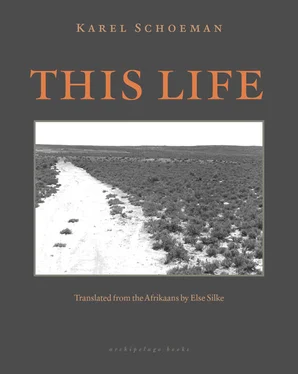Karel Schoeman - This Life
Здесь есть возможность читать онлайн «Karel Schoeman - This Life» весь текст электронной книги совершенно бесплатно (целиком полную версию без сокращений). В некоторых случаях можно слушать аудио, скачать через торрент в формате fb2 и присутствует краткое содержание. Год выпуска: 2015, ISBN: 2015, Издательство: Archipelago, Жанр: Современная проза, на английском языке. Описание произведения, (предисловие) а так же отзывы посетителей доступны на портале библиотеки ЛибКат.
- Название:This Life
- Автор:
- Издательство:Archipelago
- Жанр:
- Год:2015
- ISBN:978-0-914671-16-9
- Рейтинг книги:5 / 5. Голосов: 1
-
Избранное:Добавить в избранное
- Отзывы:
-
Ваша оценка:
- 100
- 1
- 2
- 3
- 4
- 5
This Life: краткое содержание, описание и аннотация
Предлагаем к чтению аннотацию, описание, краткое содержание или предисловие (зависит от того, что написал сам автор книги «This Life»). Если вы не нашли необходимую информацию о книге — напишите в комментариях, мы постараемся отыскать её.
considers both the past and future of the Afrikaner people through four generations of one family. In an elegiac narrator's tone, there is also a sense of compulsion in the narrator's attempts to understand the past and achieve reconciliation in the present. This Life is a powerful story partly of suffering and partly of reflection.
This Life — читать онлайн бесплатно полную книгу (весь текст) целиком
Ниже представлен текст книги, разбитый по страницам. Система сохранения места последней прочитанной страницы, позволяет с удобством читать онлайн бесплатно книгу «This Life», без необходимости каждый раз заново искать на чём Вы остановились. Поставьте закладку, и сможете в любой момент перейти на страницу, на которой закончили чтение.
Интервал:
Закладка:
Then, after that I did not know: perhaps that was why I hesitated and lost my nerve at the last moment, no matter how often I considered the possibilities and rehearsed the details of my flight in my imagination. What explanation would I give when they inevitably found me there, relentlessly demanding reasons and explanations, and what would finally come of my brief escape except that I would be brought back to town, held faster than ever by their watchfulness and concern, guarded with relentless love in a way that would leave me without even the semblance of freedom? That is why I never attempted that long journey. But had I pulled open the creaking shutters to lower myself over the window-sill in the dark, what would I have seen and heard? I turned my face away — it was only later, only now at the end of my life, that I learned to stare wide-eyed into the dark, unafraid of the voices in the silence. It remained a dream; I woke up with the tingling of snowflakes still on my lips and, seated on the edge of the bed, I reached for my clothes beside me to feel whether my shawl and the hem of my dress were still wet, my shoes still muddy from the journey.
When Maans and Stienie returned from the Karoo that year, they came in to town immediately to sympathise and to learn the details of Mother’s deathbed. I believe my answers to their questions were vague and confused, for I realised I could no longer remember the details of that distant death, neither did I know how to react to their sympathy. In a sudden upsurge of emotion Stienie advanced on me and I drew back instinctively to avoid her embrace. We rode out to visit the grave and Maans undertook to order a stone from the Boland, and we divided Mother’s personal belongings amongst ourselves, though there was not much of value except the gold chain; Maans took her Bible and hymn book, and then Stienie said she would not mind having the chain as a memento of Oumatjie, and declared that she wished for nothing else.
They spent a few days with me in town, and though Stienie chattered and fidgeted nervously and there was a steady stream of visitors to greet and to entertain, the three of us were constantly aware of the question that they were unwilling to ask and I was afraid to hear. Only when they were about to depart, their luggage already loaded on the cart that stood ready at the kitchen door and Stienie’s hat already pinned on, only then did she ask innocently and almost in passing if Tantetjie would not be lonely here in town on her own, and quite airily and casually I answered, oh no, not at all, it is so much more convenient to be here in town now that I am growing older, with the minister and the doctor close by and the neighbours always willing to help. At first I did not really know what I was saying, but it was clear as they were bidding me farewell that they were relieved, Maans because he did not have to worry about me, and Stienie because she would not be obliged to take me in. After all, she already had Betta, who was her blood relative and completely dependent on her; why should she have to be stuck with me as well? I stood at the gate, waving goodbye; I watched them ride away, my eyes following the dust from the cart all the way out of town and along the long, straight road that led to the farm. The dark, deserted farm of those winter months belonged to me, I realised, as did the house of my dreams and my unfeasible plans, and I no longer had any interest in the house to which they were returning, the house where Stienie reigned, with Betta carrying out her instructions, and where they would have provided me with a room if I had demanded it of them. It was better to remain here and endure the silent compassion or pity, to attend the prayer meetings and Sunday services alone and, once a week, to gaze out from the graveyard at the edge of town across the grey, rolling veld to where the roads climbed invisibly over the ridges.
The house was filled with a delicate spring light as bright as the reflected glitter of the snow. Sometimes I still found myself waiting or getting ready for something, sometimes I would start up suddenly because I thought someone was calling me, but that did not last long, and I soon became accustomed to my freedom. Sheltered by the garden wall or the stoep, the flowers emerged hesitantly in the cold spring, painstakingly grown, sheltered and kept alive, and in the bare, cultivated gardens of the town the trees, swaying in the eastwind, put forth buds; until October or November every night still held the possibility of frost, every day might bring a sudden whirl of snow across the rocky ridges. Against a stoep pillar of the parsonage the climbing rose Mrs Reyneke planted when she and her husband moved in the year before bloomed, but that same spring she died, and she lay buried in front of the church without ever having seen the first blooms on the young plant, their bright, translucent white petals unfurling in the bleak chill of the Roggeveld spring.
For a while people called on me on their return from the Karoo to convey their sympathy, and each time I heard the sound of horses’ hoofs in the street or a vehicle in front of the house, the squeak of the gate or the sound of footsteps across the boards of the stoep, I cringed. Gradually the danger passed, however, and the threat diminished, and it was as if people mercifully forgot about my existence, perhaps because I led such a retired life and took so little part in their activities, a silent spectator on the fringe of their meetings, a timid tantetjie in the background at their social events. Or perhaps they lost patience with my timidity and my silence, and limited themselves to the most basic tokens of politeness and goodwill. Only Maans and Stienie still came in to Nagmaal with Pieter and Betta and spent a few days with me, but it was their house too, though I saw them as intruders each time and their arrival as an invasion. For a few days the house would be filled with the sound of Stienie’s high heels on the floorboards and her chattering and her questions, her cross-examination and instructions and rummaging through cupboards — “Why don’t you rather do it this way, Tantetjie?” Fortunately Betta kept her company most of the time, for that was her task in life, and after a few days they left again and I saw the cart making its way past the thinly-scattered houses of the town and following the white road back to the farm, and I was delivered once more to my own freedom.
Thus I lived in the town house alone. How did I pass the days? I began to read again, I remember — I never had much time to read before, and Mother was always impatient when she saw me with a book and she would soon find something for me to do. The young minister would sometimes bring me a volume of sermons or a religious pamphlet because he knew Tannie liked such things, and he would smile at my strange pastime, and there were a few other people in town who also had books and who would lend them to me; the magistrate sent over his newspapers once he had finished with them, and when people in the district found out that I read, they sometimes arrived with an old book, or even a case of books they had inherited and had no use for. I read whatever I found, whatever I could, now that Mother was no longer there to complain about duties that were being shirked or candles that burnt down too quickly. “You must take care of your eyes, Tannie, you read far too much,” young Mr Reyneke scolded playfully, for he did not set much store by book-learning and his Dutch sermons were full of mistakes.
I wrote. Sometimes someone would still ask me to write a letter, and the writing materials were kept in the drawer of the dining-room table; sometimes I would take them out needlessly, the writing paper and the steel-nibbed pens and the ink, and arrange them on the table, and I would write, not the words someone else was dictating, but my own words that I had to seek and find before writing them down. Miss Le Roux had taught me to write neatly, in even, round letters with fine open loops and regular downstrokes, but when I tried to write for myself, my skilfulness would forsake me completely, and the paper would be rumpled and blotted, like the soiled, wrinkled cloths on which I had learned to embroider as a child. What did I wish to write? I no longer know — not letters, for there was no one who expected a letter from me; I suppose just the things I would have said if there had been someone to talk to, someone willing to listen and to understand, and if my tongue had not been burdened with obstructions. I know that I would sit there for a long time, facing the empty page on the bare tabletop and trying to find words, and when at last I was done, I would fold the paper several times and put it away at the back of a drawer in my wardrobe, behind the stockings and underclothes, where no one would find it. After a while I stopped, however, and one day I took out all those folded notes and burnt them in the kitchen stove without reading them again. It was not that I had lost heart because I found it too hard, only that I felt no further need to do it. And so I lived in town; for a number of years.
Читать дальшеИнтервал:
Закладка:
Похожие книги на «This Life»
Представляем Вашему вниманию похожие книги на «This Life» списком для выбора. Мы отобрали схожую по названию и смыслу литературу в надежде предоставить читателям больше вариантов отыскать новые, интересные, ещё непрочитанные произведения.
Обсуждение, отзывы о книге «This Life» и просто собственные мнения читателей. Оставьте ваши комментарии, напишите, что Вы думаете о произведении, его смысле или главных героях. Укажите что конкретно понравилось, а что нет, и почему Вы так считаете.












